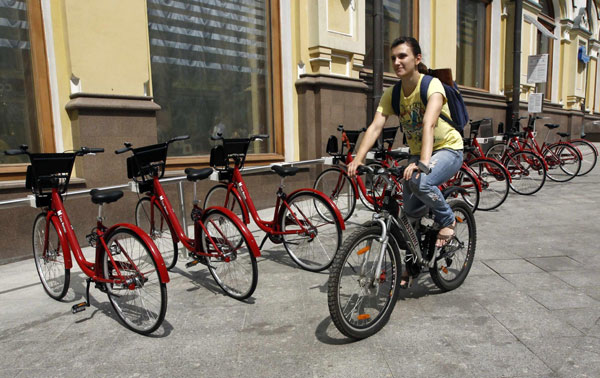

 |
|
A woman rides a bicycle past by a bicycle rental point in central Moscow, May 31, 2013. [Photo/Agencies] |
MOSCOW - Hoping to ease traffic in one of the world's most congested cities, Moscow will launch a large-scale public bike hire scheme on Saturday despite fears over road safety.
The plan, modelled on similar projects in Paris and London, aims to provide frustrated commuters and tourists with an alternative way to get about central Moscow through 1,000 bicycles docked at around 100 different locations.
"This is our latest move to boost Moscow's cycling scene, which sadly has been very underdeveloped in recent years despite the fairly large number of bike enthusiasts in Moscow," Mayor Sergei Sobyanin said at one the stations on Thursday.
Some Muscovites worry that not enough has been done to protect cyclists on the city's traffic-clogged streets.
"It's the wrong way round, they should have introduced cycle lanes first and then brought in the bikes. It's chaos on the roads, I'll only be riding on the pavements," said 25-year old Yelizaveta Ovchinnikova.
According to digital mapmaker TomTom's Annual Congestion Index, Moscow has the worst traffic of all cities in the world with journeys commonly taking over double the required time during the near gridlock of morning rush hour.
Russia has also gained fame for its erratic drivers with footage of cars overtaking on blind corners, rear-ending each other and careening off the road amassing millions of views on video-sharing site YouTube.
Death rates from road accidents are higher than in most Western countries, and Russian lawmakers are moving to toughen drunk-driving penalties.
A motorist police say had been drinking and had no driver's licence hit a family of three on bicycles earlier this month, killing the woman and injuring the man and their son.
"The roads are bit dangerous at the moment, but drivers will get used to cyclists eventually - it's a question of habit," said barman Denis Kazachenko, 26, who said the bike sharing scheme was a great idea.
Its launch coincides with the introduction of paid parking in much of central Moscow but there is little sign many motorists, enthusiastic about driving in a country where car ownership was rare before the 1991 Soviet collapse, will switch to cycling.
Another worry is the risk that the thin-framed red bikes could be stolen or vandalised.
"It's a good plan in principle, but it's only a matter of time until the bikes start disappearing - this is Russia after all," said 30-year-old administrator Katia Sokolova.
After registering online, cyclists can use the bikes free of charge for the first 30 minutes or pay 950 roubles ($30) for the season, which lasts until October 31 after which the snow and ice make cycling inadvisable.







